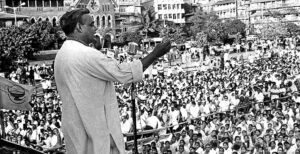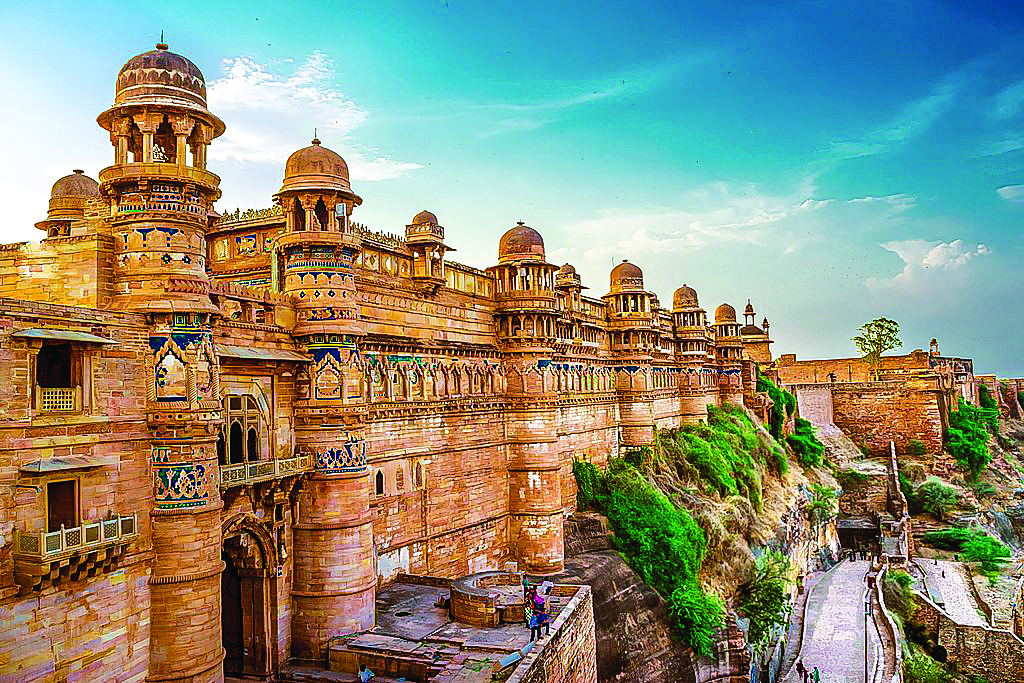Titans, including Atal Bihari Vajpayee, have shown their mettle in Gwalior, but the constituency’s allegiance is mostly towards the royal lineage of Scindias since independence.
The Gwalior Lok Sabha constituency is one of the 29 parliamentary constituencies in the central Indian state of Madhya Pradesh. Here’s an overview of its history:
The constituency was formed in 1952, the year of the first general elections in India. Gwalior is known for its historical and cultural significance, including the Gwalior Fort, and has a mix of urban and rural population. It has a diverse electorate with a mix of various communities, including a significant number of Scheduled Castes and Scheduled Tribes. The constituency has seen representation from various political parties over the years, but it has traditionally been a stronghold for the Indian National Congress (INC) in the early years. From the 1980s onwards, the Bharatiya Janata Party (BJP) started gaining influence in the region, marking a shift in the political landscape. The Scindia family’s influence, particularly through Jyotiraditya Scindia, has been a significant factor, although Jyotiraditya’s shift from the INC to the BJP in 2020 added a new dimension to the constituency’s political dynamics.
The Gwalior Lok Sabha constituency continues to be a politically significant and dynamic region, reflecting the broader electoral trends and political shifts in Madhya Pradesh and India as a whole. Let’s deep dive into the history of Gwalior Lok Sabha Constituency:
Political Dynasty Drama
Scindia Family Rivalries: The Scindia family, although influential and respected, has had internal rivalries that have spilled over into public politics. For instance, Madhavrao Scindia’s departure from the Indian National Congress to form the Madhya Pradesh Vikas Congress in 1996 was a significant political drama. His differences with other INC leaders highlighted the factionalism within the party and the family’s complex political dynamics.
Unusual Electoral Outcomes
Tie and Recount in 1967: In the 1967 Lok Sabha elections, Gwalior witnessed an unusually tight contest between INC’s Vijaya Raje Scindia and Jana Sangh’s A. G. Kher. The results were so close that they necessitated a recount, an uncommon occurrence in Indian elections at the time.
Royalty and Politics
Royal Titles and Politics: Gwalior has a unique blend of royal history and modern politics. Vijaya Raje Scindia, also known as the Rajmata of Gwalior, was a prominent political figure who transitioned from royalty to politics. Her regal background often created an interesting juxtaposition with her political campaigns and public engagements.
Party Switching
Frequent Party Switching: The constituency has seen several instances of political leaders switching parties, sometimes in rapid succession. Jyotiraditya Scindia’s switch from the INC to the BJP in 2020 was a high-profile case that sent shockwaves through Indian politics. His move was seen as both a strategic shift and a dramatic political realignment, given his family’s historical ties to the Congress.
Assassination Attempt
Assassination Attempt on Madhavrao Scindia: In 1989, there was an assassination attempt on Madhavrao Scindia during a campaign rally in Gwalior. Though he survived, the incident added an element of danger and drama to the political climate in the region.
Legal Battles and Controversies
Election Petitions and Legal Battles: Gwalior’s political history includes numerous election petitions and legal battles. Candidates have often resorted to the courts to challenge election results, adding a layer of legal drama to the political scene.
Use of Royal Influence
Campaigning in Palatial Settings: The use of royal palaces and heritage sites as backdrops for political events is a peculiar feature of Gwalior politics. Candidates from the Scindia family, in particular, have hosted political gatherings in their historic residences, adding a touch of grandeur to their campaigns.
Members of Parliament
Vishnu Ghanashyam Deshpande: He was an Indian politician and first Lok Sabha member from Gwalior. He was born in Mehkar, Vidarbha, Maharashtra. V.G. Deshpande was the general secretary of the Akhil Bharatiya Hindu Mahasabha. In the 1951 general election, V.G. Deshpande managed to get elected from two Lok Sabha constituencies (Gwalior and Guna). In Guna he obtained 56,518 votes (40.70% of the votes in the constituency), defeating the Indian National Congress candidate Gopi Krishna Vijayvargiya. In Gwailor he got 65,695 votes (45.49%), defeating the Vaidehi Charan Parashar.
Vijaya Raje Scindia: She was third Lok Sabha member from Gwalior. Born as Lekha Divyeshwari Devi, she was also popularly known as the Rajmata of Gwalior. In the days of the British Raj, as consort of the last ruling Maharaja of Gwalior, Jivajirao Scindia, she ranked among the highest royal figures of the land. In later life, she became a politician of considerable influence and was elected repeatedly to both houses of the Indian parliament. She was one of the founding members of the Bharatiya Jana Sangh. Vijayaraje was initiated into electoral politics in 1957 when she contested and won the Guna Lok Sabha seat in Madhya Pradesh on a Congress ticket. Five years later, she won on a Congress ticket from Gwalior. Later, she quit the Congress and won the Guna seat in 1967 on Swatantra Party’s ticket. She soon joined Bharatiya Jan Sangh and resigned from Lok Sabha to take part in state politics. Jan Sangh defied the Indira-wave in the 1971 Lok Sabha polls to win 3 seats in Gwalior region – Vijaya Raje Scindia from Bhind, Vajpayee from Gwalior and Madhavrao Scindia from Guna, though he later left the party. Vijayaraje Scindia lost to Indira Gandhi in Rae Bareli in 1980. In 1989, she won from Guna as member of Bharatiya Janata Party (BJP), and retained the seat in 1991, 1996 and 1998. She was mother of Madhavrao and grandmother of Jyotiraditya Scindia.
Ram Awtar Sharma: He was an Indian politician and was elected to the Lok Sabha, the lower house of the Parliament of India, from Gwalior in Madhya Pradesh, as a member of the Bharatiya Jana Sangh. Sharma died at Gwalior on 29 October 1987 at the age of 79 years.

Atal Bihari Vajpayee: He was an Indian politician and poet who served three terms as the 10th Prime Minister of India, first for a term of 13 days in 1996, then for a period of 13 months from 1998 to 1999, followed by a full term from 1999 to 2004. He was the first non-Indian National Congress prime minister to serve a full term in the office. Vajpayee was one of the co-founders and a senior leader of the Bharatiya
Janata Party. He was a member of the RSS, a Hindu nationalist volunteer organisation. While he had won the 1977 and the 1980 elections from New Delhi, Vajpayee shifted to his home town Gwalior for the election. Vidya Razdan was initially tipped to be the Congress (I) candidate. Instead, Madhavrao Scindia, scion of the Gwalior royal family, was brought in on the last day of filing nominations. Vajpayee lost to Scindia, managing to secure only 29% of the votes. He served as Member of Parliament, Lok Sabha, for various terms starting at Balrampur from 1957–1962. He served again from Balrampur from 1967–1971, then from Gwalior from 1971–1977, and then from New Delhi from 1977–1984. Finally, he served from Lucknow from 1991–2009.
Narain Krishna Rao Shejwalkar: He was a member of Lok Sabha from Gwalior. He was elected to 6th and 7th Lok Sabha from Gwalior. He also served as member of Rajya Sabha and was the Mayor of Gwalior Municipal Corporation during 1970–71. His son Vivek Shejwalkar was elected to 17th Lok Sabha from Gwalior (Lok Sabha constituency) in 2019.
Madhavrao Jivajirao Scindia: He was the only politician, who emerged as the MP from Gwalior for record five times, and a minister in the Government of India. He was a member of the Indian National Congress party. Scindia was the son of Jiwajirao Scindia, the last ruling Maharaja of the princely state of Gwalior during the British Raj. Upon the death of his father in 1961, and under terms agreed to during the political integration of India, Scindia succeeded to a privy purse, certain privileges, and the use of the title “Maharaja of Gwalior,” which lasted until 1971, whereupon all were abolished by the 26th Amendment to the Constitution of India. A nine-term member of the Lok Sabha, Madhavrao Scindia never lost an election since 1971, when he won for the first time from Guna constituency at the age of 26. He contested the election on the ticket of Bharatiya Jana Sangh (the precursor of the present day Bharatiya Janata Party), which his family had long patronised. When the Emergency, he fled the country into self-imposed exile in the United Kingdom. After he returned to India, he resigned from the Bharatiya Jana Sangh. He contested from Guna constituency as an independent candidate and won the seat a second time in spite of the wave in favour of the Janata Party. In the 1980 election, he switched allegiance to the Indian National Congress and won from Guna a third time. In 1984, he was nominated as the Congress party’s candidate from Gwalior in a last-minute manoeuvre to defeat the Bharatiya Janata Party’s Atal Bihari Vajpayee, and won by a massive margin. After that Scindia contested from either Gwalior or Guna and won on each occasion. He died at the age of 56, in a plane crash in Motta village, which is on the outskirts of Mainpuri district of Uttar Pradesh, on 30 September 2001.
Yashodhara Raje Scindia: She was first elected from Gwalior (Lok Sabha constituency) to the 14th Lok Sabha via a by-poll in 2007 and again in 2009 General Election. She is was a Minister of Sports and Youth Welfare, Technical Education and Skill Development and Employment of Madhya Pradesh. She is also the former Minister for Commerce, Industries and Employment in Government of Madhya Pradesh. She is the youngest daughter of Jivajirao Scindia, Maratha Maharaja of Gwalior and the Late Rajmata Vijayaraje Scindia of Gwalior. She is a Member of Legislative Assembly from Shivpuri constituency in Madhya Pradesh since 2013.
Narendra Singh Tomar: He is an Indian politician and a member of the Madhya Pradesh Legislative Assembly. He is the former Minister of Agriculture and Farmers’ Welfare. He has been Minister of Rural Development, Minister of Panchayati Raj, Minister of Mines and Minister of Parliamentary Affairs in the Government of India during different periods of the First and Second Modi ministry. He is a leader of Bharatiya Janata Party. He was also a member of Fifteenth Lok Sabha from 2009 to 2014 from Morena; Sixteenth Lok Sabha from 2014 to 2019 from Gwalior and 17th Lok Sabha from 2019 to 2023 from Morena. In 2019, he changed his constituency and was re-elected to the Lok Sabha from Morena.
Vivek Narayan Shejwalkar: He is an Indian politician. He was elected to the Lok Sabha, lower house of the Parliament of India from Gwalior, Madhya Pradesh in the 2019 Indian general election as member of the Bharatiya Janata Party. His father Narain Krishna Rao Shejwalkar was elected to 6th Lok Sabha and 7th Lok Sabha from Gwalior (Lok Sabha constituency). He was also a Mayor of Gwalior Municipal Corporation.







